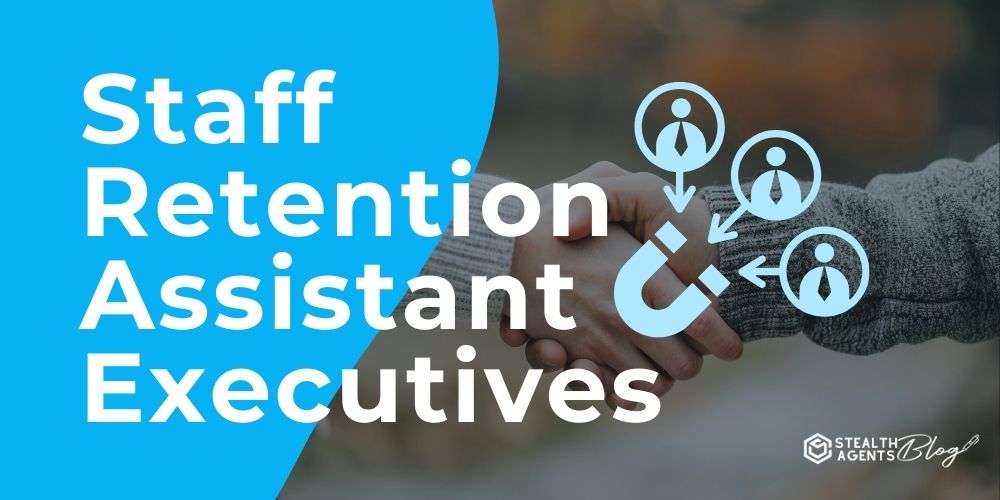Staff retention for assistant executives is the key to maintaining leadership stability and productivity. Stealth Agents helps businesses keep top executive support talent by providing reliable, professionally managed virtual assistants who stay committed for the long term.
Due to inadequate retention strategies, companies can lose up to 25% of their workforce annually.
Staff retention assistant for executives are paramount in overcoming this challenge and ensuring a stable and motivated workforce.
High turnover rates negatively impact productivity and increase operational costs, creating a societal issue that demands attention.
Organizations need to focus on nurturing employee satisfaction and loyalty with dedicated professionals.
Stealth Agents stands out as a trusted partner, offering skilled staff retention assistant executives and free consultations on client preferences and virtual assistant pricing.
With their expertise, businesses can effectively reduce turnover rates. Investing in retention strategies is not just beneficial but necessary for future growth.
How to Know When It’s Time for a Virtual Executive Assistant
Recognizing when you need extra help isn’t always obvious, until you’re knee-deep in an avalanche of unread emails, back-to-back meetings, or reports that just won’t write themselves. If this sounds uncomfortably familiar, it might be time to bring in a virtual executive assistant.
Here are a few telltale signs:
- Your inbox looks more like a spam folder than a communication tool.
- Meetings keep colliding like cars in a downtown roundabout.
- You’re still returning phone calls from last week, if you remember to return them at all.
- Family, colleagues, or even your favorite barista have commented on your work-life balance (or lack thereof).
- Routine business operations slow down because you’re tackling admin tasks instead of making big-picture decisions.
What Is A Staff Retention Assistant Executive?
Staff retention assistant executives are pivotal in ensuring workforce stability by focusing on employee engagement and satisfaction.
These professionals craft retention strategies that align with the specific needs of both the company and its staff, ensuring a motivated and committed team.
They leverage data insights to understand employee attrition reasons and develop actionable plans that enhance retention of employees rates, thereby reducing turnover costs and boosting productivity.
Industry research indicates that companies with robust retention programs can experience up to 50% lower turnover rates compared to those lacking such initiatives.
Staffing virtual assistant play a key role by supporting HR teams to cultivate a supportive work environment that nurtures employee loyalty and fosters professional development.
Their contributions are vital not only in addressing employee concerns and acknowledging achievements but also in promoting a positive organizational culture that enhances job satisfaction and longevity.
Recognizing and rewarding employees for their hard work goes a long way, especially in today’s flexible and often remote work environments. A simple thank you or a moment to highlight how someone’s efforts have made a difference can be incredibly meaningful.
Even if you don’t have a formal rewards program or a large budget, you can still create compelling recognition opportunities. Whether it’s a shoutout during a team meeting, a personalized note, or establishing small but thoughtful traditions, showing genuine appreciation encourages people to go the extra mile and reinforces a sense of belonging within the team.
This expertise strengthens the company’s financial performance and builds a more unified and dedicated workforce.
How Can Busy Executives Benefit from Hiring a Virtual Executive Assistant?
For time-pressed executives, partnering with a skilled virtual assistant can be transformational. By offloading routine administrative tasks, like calendar management, email triage, meeting coordination, and document preparation, executives can reclaim valuable hours every week to focus on high-impact leadership responsibilities.
Virtual executive assistants act as reliable extensions of your team, proactively handling daily operations and reducing workplace bottlenecks. This not only allows leaders to drive strategic initiatives and business growth but also supports a healthier work-life balance.
Moreover, with trusted providers like Stealth Agents overseeing onboarding and management, executives experience seamless support tailored to their unique needs, boosting overall efficiency and reducing stress.
Advantages of Hiring Through a Managed Service Provider
One of the leading benefits of hiring a virtual executive assistant via a managed service provider is the streamlined onboarding process. You don’t have to spend precious hours sifting through résumés, vetting candidates, or conducting lengthy interviews. The provider does the heavy lifting, screening, qualifying, and training assistants, so you receive a professional who’s already equipped to step in and support your leadership team.
This approach is especially helpful for executives who:
- Prefer to avoid the complexities of hands-on management and training,
- Lack experience with remote hiring or delegation,
- Need quick access to reliable support without the usual HR delays.
What Challenges Do Staff Retention Assistant Executives Face?
1. Understanding Employee Needs and Preferences
Addressing the varied needs of employees is a significant challenge for assistant executives focused on staff retention.
Each employee brings distinct expectations, necessitating a sophisticated approach to comprehend and respond to these needs truly.
Executives must move beyond standard surveys, engaging in genuine conversations that uncover real employee concerns and motivations.
Misalignments often arise when assumptions eclipse true preferences, leading to disengagement. Bridging this gap requires exceptional listening skills and the ability to interpret nuanced cues.
They cultivate an environment where employees feel valued and heard, significantly impacting their commitment.
Developing retention strategies involves understanding current needs and anticipating future trends.
By emphasizing business employee training and development requirements, executives can ensure employees are equipped for growth, enhance loyalty, and reduce turnover rates.
Prioritizing employee-centric policies is crucial for fostering long-term dedication and minimizing attrition.
2. Managing Competitive Compensation and Benefits
Compensation remains a critical factor in employee retention. They face the pressure of aligning compensation packages with industry standards while maintaining budget constraints.
Offering competitive salaries is essential, yet benefits and perks also play a significant role in retaining talent.
The challenge lies in crafting a well-rounded package that appeals to a diverse workforce without stretching financial resources.
Executives must conduct regular market analyses to stay abreast of compensation trends.
Transparent communication about compensation policies builds trust, ensuring employees understand how their contributions are valued.
Balancing fairness and competitiveness requires strategic planning and a thorough understanding of both organizational capabilities and employee expectations.
3. Cultivating a Positive Work Environment
Cultivating a positive work culture is essential for retaining employees.
In toxic environments, talented individuals often seek opportunities elsewhere, making it imperative for them to create a supportive and inclusive setting.
This involves fostering open communication, celebrating achievements, and promoting teamwork. Executives must remain vigilant, swiftly addressing any negativity.
By implementing positive workplace culture ideas such as initiatives that support work-life balance and mental health, job satisfaction can be greatly enhanced.
Regular feedback sessions offer employees the chance to express concerns, strengthening their sense of belonging.
Emphasizing a healthy work environment not only boosts morale and retention rates but also ensures the company retains its top talent.
These strategies are crucial as they directly contribute to a thriving and motivated workforce.
4. Offering Growth and Development Opportunities
Employees seek not just jobs, but career paths. Providing growth and development opportunities presents a significant challenge for staff retention assistant executives as they strive to meet these aspirations.
Offering training programs, mentorship, and clear career progression paths is vital.
However, aligning these initiatives with individual career goals requires careful planning.
Executives must identify skill gaps and provide targeted learning experiences that empower employees to advance.
Regular performance reviews and personalized development plans keep employees motivated and engaged.
By investing in their growth, executives not only enhance skill sets but also strengthen loyalty and retention. The focus is on creating a culture of continuous learning.
5. Addressing Work-Life Balance Concerns
Balancing work and personal life is an increasing concern for employees, presenting significant challenges for staff retention strategies.
Assistant executives tasked with retaining staff must implement policies that support flexibility while maintaining productivity.
Options such as remote work, flexible hours, and wellness programs are becoming crucial. Yet, the challenge lies in crafting policies that cater to the diverse needs of individuals, as a universal approach often falls short.
Executives must remain adaptable, offering personalized solutions that fit varied lifestyles.
Monitoring employee well-being through regular check-ins is essential to ensure that support measures are effective.
By applying work life balance techniques, organizations can foster a work environment that values personal time, enhancing job satisfaction and loyalty, which ultimately reduces turnover and strengthens organizational commitment.
These techniques are vital as they enable a supportive atmosphere where employees feel valued and motivated.
6. Rethinking Performance Reviews: The Power of Continuous Feedback
Gone are the days when annual reviews stood as the sole marker of progress. Today, ongoing conversations offer a more effective alternative, providing real-time insights and guidance throughout the year.
Regular one-on-one discussions allow leaders and team members to address goals, celebrate growth, and overcome challenges as they arise. Instead of waiting months to reflect on performance, individuals receive immediate feedback that helps them course-correct and seize new.
opportunities. This approach not only encourages development but also boosts motivation, as employees feel seen, supported, and invested in.
By collaboratively mapping out pathways for professional advancement, managers can help employees set realistic milestones and visualize a future within the organization.
Such consistency nurtures a sense of trust and clarity, strengthening both retention and engagement.
7. Navigating Change with Effective Communication
Change is inevitable in any organization, and how it’s managed plays a significant role in employee retention. Staff retention assistant executives must guide teams through transitions, be it restructuring, new technology rollouts, or shifts in company strategy, by fostering a climate of trust and transparency.
Keeping employees well-informed reduces uncertainty and fear. Leaders should prioritize clear, consistent communication by sharing updates as soon as possible and outlining not just what is changing, but why. Whether it’s through team meetings, one-on-one conversations, or digital channels, providing platforms for employees to ask questions and voice concerns is crucial.
Additionally, inviting feedback and involving employees in the change process fosters a sense of ownership and collaboration. When employees feel their perspectives are valued, resistance to change often gives way to engagement.
Leaders should also recognize that change can be stressful. Offering support resources, such as access to employee assistance programs or additional training, demonstrates empathy and commitment to staff well-being.
By approaching change management with transparency, support, and active listening, organizations can minimize disruptions, maintain morale, and reinforce their dedication to retaining top talent.
What Key Tasks Do Staff Retention Assistant Executives Handle?
1. Conducting Employee Surveys and Feedback Sessions
Gathering feedback is a fundamental task for staff retention assistant executives.
By conducting regular employee surveys, they can capture insights about workplace satisfaction and areas needing improvement.
Engaging employees through feedback sessions allows for open dialogue, helping executives understand the root causes of dissatisfaction.
This process is crucial as it reveals trends and patterns in employee sentiment that might otherwise go unnoticed.
Feedback must be analyzed carefully to create actionable plans that address genuine concerns.
Effectively incorporating this feedback into organizational strategies can lead to improved morale and retention.
By championing transparent communication, executives help foster a culture of trust and openness.
2. Developing Comprehensive Retention Strategies
Crafting effective retention strategies is a key responsibility for staff retention assistant executives. They must assess the organization’s current practices and identify areas for improvement.
This involves setting clear objectives and establishing metrics to measure success.
Understanding the unique needs of the workforce is essential in developing tailored programs that resonate with employees.
Strategies may include professional development opportunities, recognition programs, and flexible work arrangements.
Collaborating with other departments ensures these initiatives align with broader organizational goals.
Consistent evaluation and adjustment of these strategies are necessary to remain relevant and impactful.
By focusing on comprehensive strategies, executives can significantly reduce the turnover rates.
3. Coordinating Training and Development Programs
Providing training and development programs is essential for retaining talent within organizations.
Staff retention assistant executives play a critical role in orchestrating these initiatives to align with both organizational goals and employee expectations.
They must identify skill gaps and collaborate with department leaders to create pertinent training modules.
These programs should be varied, addressing different learning preferences and career goals.
Executives ensure that training remains accessible and engaging, fostering an environment of continuous learning.
The use of a training and development virtual assistant can significantly aid in streamlining these processes, offering efficient coordination and enhanced program accessibility.
By monitoring program outcomes, executives can refine future offerings for maximum impact.
Investing in employee development ultimately boosts job satisfaction and loyalty, necessitating meticulous planning and execution to achieve optimal results.
4. Managing Onboarding Processes
Effective onboarding is essential for new hires’ long-term success and retention. Staff retention assistant executives manage this process to ensure a smooth transition for newcomers.
They collaborate with HR to design onboarding programs that integrate new employees into the company culture.
Providing comprehensive information about their roles, staff retention assistant for executives responsibilities, and available resources is vital.
Executives oversee mentorship pairings and initial training sessions to facilitate a supportive environment.
Regular check-ins during the onboarding period help address any issues and reinforce engagement.
A well-structured onboarding experience can leave a lasting impression and significantly impact retention.
This task is about making new employees feel welcomed and valued from day one.
5. Monitoring Employee Engagement and Satisfaction
Monitoring employee engagement and retention strategies is a vital responsibility for staff retention assistant executives.
They employ an array of tools to assess engagement levels and detect early signs of dissatisfaction.
Regularly scheduled engagement surveys and one-on-one meetings are key components in this strategy.
Recognizing and addressing issues swiftly prevents them from escalating and negatively impacting retention.
Employee engagement virtual assistant play a crucial role here, as they streamline data collection and analysis, allowing executives to efficiently identify and address workforce concerns.
By examining engagement data, executives can customize initiatives that enhance workplace satisfaction.
Cultivating an environment where employees feel aligned with the organization’s mission strengthens overall morale.
This ongoing task requires a proactive approach to ensure employees remain motivated and committed to their roles.
6. Utilizing Exit Interviews for Retention Insights
Exit interviews serve as a powerful tool for staff retention assistant executives. When employees choose to leave, these conversations offer a candid glimpse into their experiences, revealing both strengths and hidden pain points within the organization.
By gathering honest feedback during exit interviews, executives can pinpoint the factors driving turnover, whether it’s management issues, lack of growth opportunities, or concerns about company culture.
Systematically analyzing exit interview responses helps identify recurring themes that may not surface through routine feedback channels. This information is essential for refining retention strategies and addressing issues before they affect remaining staff.
Thoughtfully implementing changes based on exit interview findings demonstrates a genuine commitment to continual improvement, helping to reduce future attrition and foster a more engaged, loyal workforce.
How Does Stealth Agents Assist In Finding Staff Retention Assistant Executives?
Stealth Agents is instrumental in helping companies secure staff retention assistant executives through a thorough and strategic talent acquisition process.
Their proficiency lies in pinpointing the unique requirements of businesses and aligning them with candidates who not only possess the requisite skills and experience but also resonate with the company’s culture and objectives.
This cultural alignment is crucial, with studies indicating that organizations boasting a strong cultural fit experience a 30% improvement in retention rates.
By leveraging data-driven insights, Stealth Agents adeptly identifies trends and patterns in employee retention, empowering them to make strategic hiring decisions.
Their virtual assistant capabilities further streamline processes, ensuring efficiency and precision.
With a steadfast commitment to quality, Stealth Agents significantly curtails turnover, thereby reducing the hefty costs linked to recruitment and training.
As a trusted ally, they play a pivotal role in fortifying leadership teams, underscoring their importance in the realm of corporate staffing solutions.
Takeaways
Retaining top talent is crucial for any organization’s long-term success. Staff retention assistant executives play a pivotal role in crafting strategies that keep valuable team members engaged and satisfied.
By focusing on the unique needs of employees, these professionals ensure a harmonious work environment that fosters loyalty and productivity.
Their expertise lies in understanding the dynamics of employee satisfaction and creating tailored solutions to minimize turnover.
As organizations face increasing competition, the role of staff retention assistant executives becomes even more significant in maintaining a competitive edge.
Their insight and strategic planning are key to cultivating a workforce that is both committed and motivated.
By investing in these essential services, companies can significantly reduce the costs associated with high turnover rates.
Consider leveraging the experience of virtual assistants from Stealth Agents to enhance your retention strategies.
Keeping great assistants is key for your business. Stealth Agents helps you find and keep talented virtual assistants. This way, you can focus on what really matters. Get started today
Frequently Asked Questions
What are the key responsibilities of a staff retention assistant for executives?
A staff retention assistant helps keep employees happy and engaged so they stay with the company. They create plans to reduce employee turnover, study why people leave, and work on ways to improve the workplace. They also help recognize employee achievements and support HR teams in making the work environment better.
How do staff retention assistants utilize data to improve employee retention?
They use data to figure out why employees leave by looking at patterns and trends. This helps them create plans to fix problems and keep employees longer. Using this information, they can make programs that improve job satisfaction and reduce turnover.
Why is cultural alignment important in hiring staff retention assistant executives?
Cultural alignment means the assistant shares the company’s values and goals. This is important because employees who feel they fit in with the company are more likely to stay. Companies with a good cultural fit often see fewer employees leaving.
How can virtual assistants support staff retention efforts?
Virtual assistants help by taking care of tasks like collecting and organizing data or sending out messages. This gives staff retention assistants more time to focus on bigger projects. Their help makes it easier to create and carry out plans to keep employees happy.
What industries benefit most from staff retention assistant executives?
Industries like healthcare, technology, and customer service, where many employees leave jobs quickly, benefit the most. Staff retention assistants help these industries by creating plans to solve specific problems, making employees more satisfied and likely to stay.
How do staff retention assistants address diverse employee needs?
They listen to employees and learn about their concerns and what motivates them. This helps them create personalized plans that make employees feel valued and understood. By addressing different needs, they improve job satisfaction for everyone.
What role do staff retention assistant executives play in onboarding?
They help new employees feel welcome and comfortable by creating programs that explain the company culture and their roles. A smooth onboarding process helps new hires feel engaged and more likely to stay with the company.
How do staff retention assistants contribute to a positive work environment?
They encourage open communication, celebrate employee achievements, and support teamwork. They also create programs that help with work-life balance and mental health. By addressing problems quickly, they help keep the workplace supportive and inclusive.
What are common challenges faced by staff retention assistant executives?
Some challenges include understanding the needs of different employees, offering fair pay and benefits, and creating a good work environment. They also need to provide chances for growth and make sure employees have a good balance between work and personal life.
How do staff retention assistants enhance leadership team effectiveness?
They help leaders by making sure employee retention plans match the company’s goals. They share information about what employees need and create programs to improve morale and productivity. This allows leaders to focus on important business goals while keeping employees happy.










